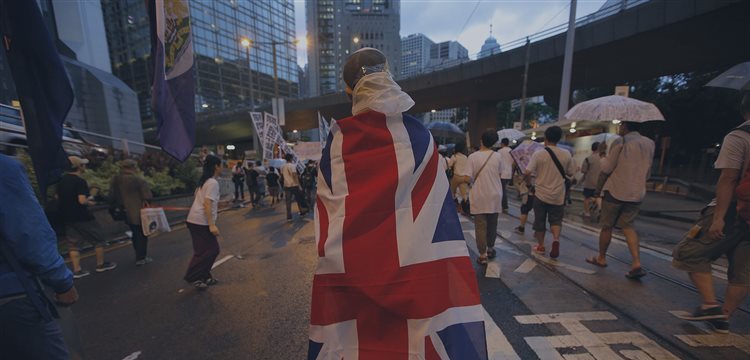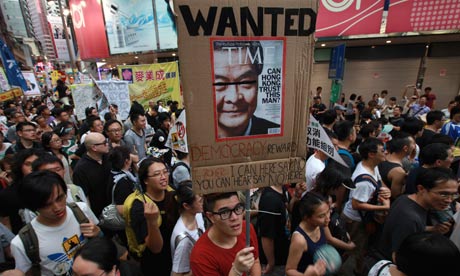This weekend Financial Secretary John Tsang admitted that the government was not psychologically prepared for such scale of the protests. He might have thought student protests would be confined to bankrupt countries like Greece, where youth unemployment sits at around 50% — not a place like Hong Kong, where the government regularly accumulates mountains of budget surpluses from its citizens.
But Hong Kong has its own brand of economic failure that does not show up in fiscal balances or unemployment rates.
It's almost undoubtedly that Hong Kong’s government has enough might to stifle the student protests that have paralyzed its central business district this past week. But it will take more efforts to recognize and deal with the underlying social demands that mobilized so many tens of thousands — if not hundreds of thousands — of youths to take to the streets demanding democracy.
A frequently asked question in this past week is just how such an outwardly prosperous society has found itself in such division and strife?
We have witnessed students tear-gassed and attacked over recent days, some of whom were later accused of having triad connections. Meanwhile, the threat of a violent crushing of the demonstrations hangs over the protestors after Chief Executive C.Y. Leung warned over the weekend that the government would take “all necessary actions” to secure order.
On Monday morning morning, there has been no crackdown nor removal of the protestors in Hong Kong, as the uneasy standoff continues, with the promise of both sides engaging in talks.
Yet already the city has been severely shaken by the past week’s events. As Financial Secretary John Tsang suggested, the government was not psychologically prepared for the scale of the protests.
Perhaps he thought student protests would be confined to bankrupt countries like Greece or Spain, where youth unemployment sits at around 50% — not a place like Hong Kong, where the government regularly accumulates mountains of budget surpluses from its citizens.
Hong Kong, however, has its own brand of economic failure that does not show up in fiscal balances or unemployment rates. Instead, it is vivid in jobs that pay wages too low to make a living (the minimum wage is just 30 Hong Kong dollars ($3.87) an hour) and property prices that are too high to find somewhere big enough to live. These problems are not new, but by far they have reached a breaking point.
Failure to address such basic social demands by the successive authorities put the region on the brink of revolt.
Photo credit: The Guardian
Authorities can hardly claim they were not warned. Back in 2009, then Chinese Premier Wen Jiabao raised the issue of ”deep rooted” contradictions in Hong Kong when he admonished Donald Tsang, the territory’s chief executive at the time, to do better in maintaining “Hong Kong’s harmony and stability.”
This contradiction is observed in Hong Kong’s off-the-chart income inequality, with almost 20% of the population living below the poverty line, according to a government report issued last year.
And since those comments by Wen, the forces behind this polarization in wealth and income have gone into overdrive.
At its root is Hong Kong’s persistence in keeping its 30-year-old peg to the U.S. dollar.
It has long been recognized that this dollar anchor requires periods of asset inflation, as monetary policy is outsourced to the U.S. Federal Reserve. But these costs have ratcheted up since the Fed embarked on its unprecedented monetary easing, just as China allowed the yuan USDCNY, -1.12% to appreciate — up by more than a third against the Hong Kong dollar USDHKD, -0.06% since 2005.
For many this has been a toxic currency cocktail, simultaneously generating inflation while witling away the purchasing power of the Hong Kong dollar. It has led to an extended period of interest rates at near zero and has sent property prices soaring. Since 2006 many properties have tripled in value, leading to a huge wealth transfer to owners of real estate.
Although China has integrated its people, trade and capital markets with Hong Kong, there has been no currency integration. This is an increasingly costly arrangement. The ascend of the yuan against a suppressed Hong Kong dollar has perhaps been even more painful than the inflation.
While China was once a deflationary counterweight to periods of Hong Kong inflation, this has reversed. Instead of Hong Kong people traveling over the border for cheap recreation or shopping, mainland Chinese flood into the territory as the currency arbitrage makes for bargains in everything from luxury goods to daily essentials.
Because the winners from the regime are big business and government, there have been few demands to reform the peg. It benefits property tycoons and owners of retail businesses selling to mainland Chinese tourists, while corporations enjoy low financing costs. Likewise, the government rakes in ever-higher land premiums.
The acceptability of the currency arrangement has been questioned before. Notably by former Hong Kong Monetary Authority chief Joseph Yam after he left his office. In September 2011, Pershing Square hedge-fund manager Bill Ackrman argued that a Hong Kong dollar revaluation would show that authorities were serious about addressing local tensions and the political divide.
It is unlikely that the calls for a full-scale cure in Hong Kong politics will go away without bridging this currency divide.




